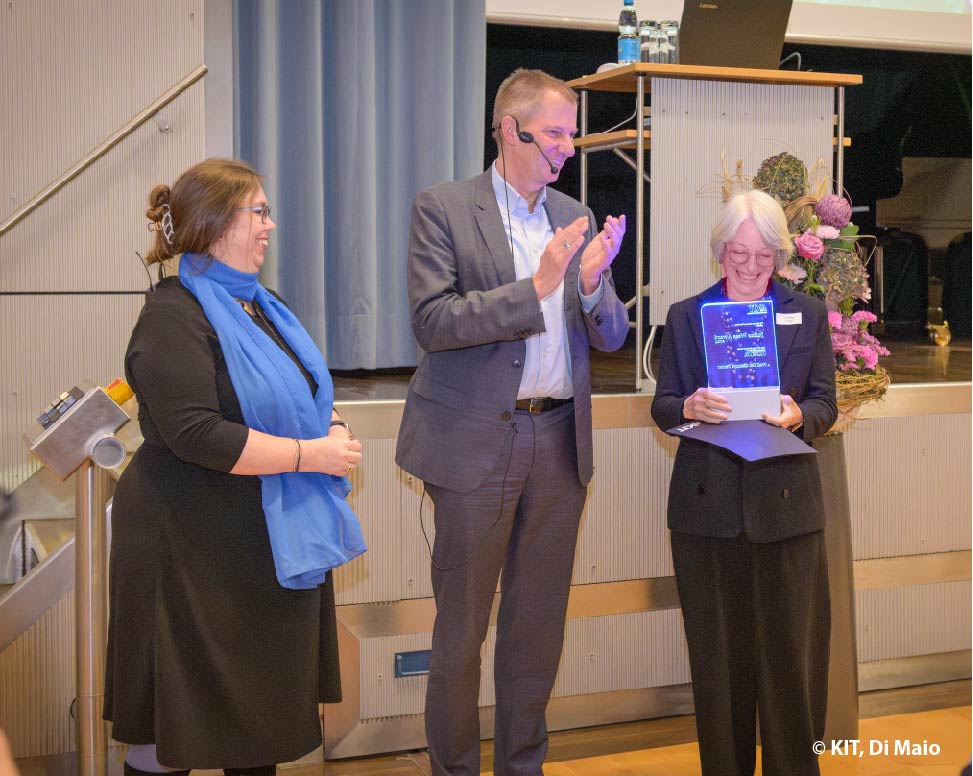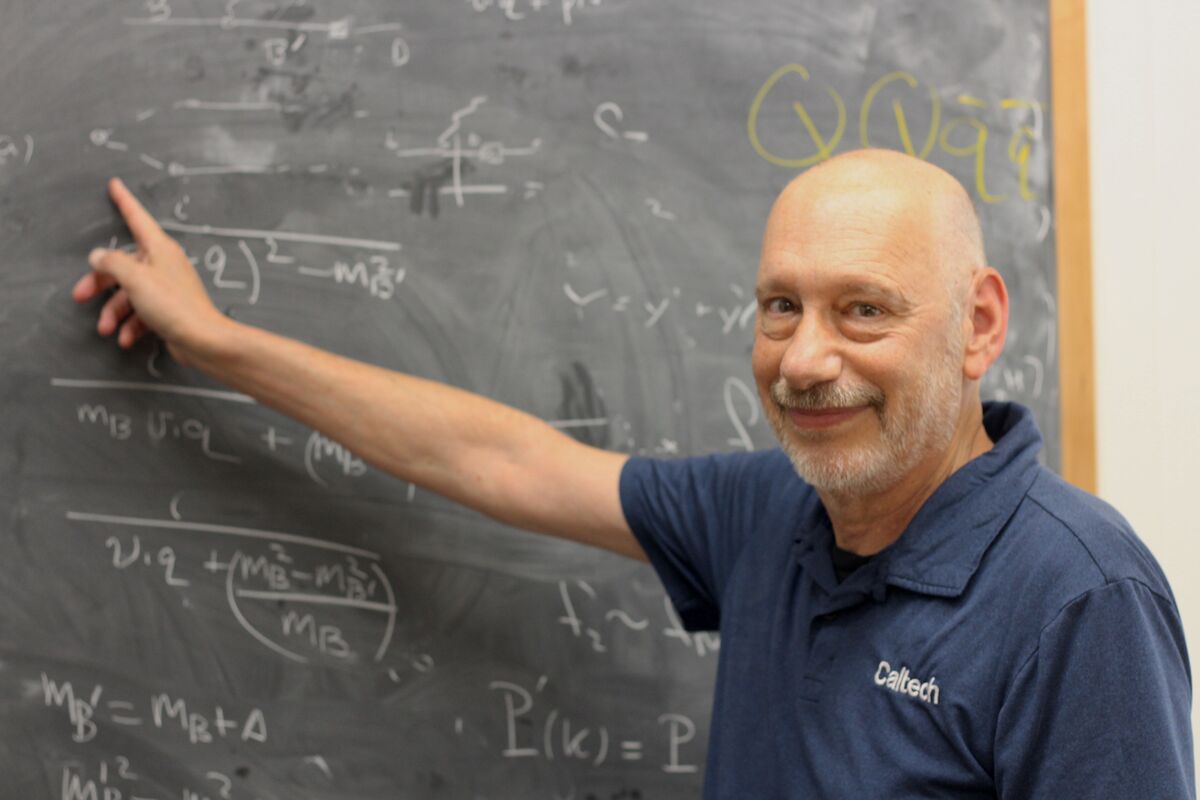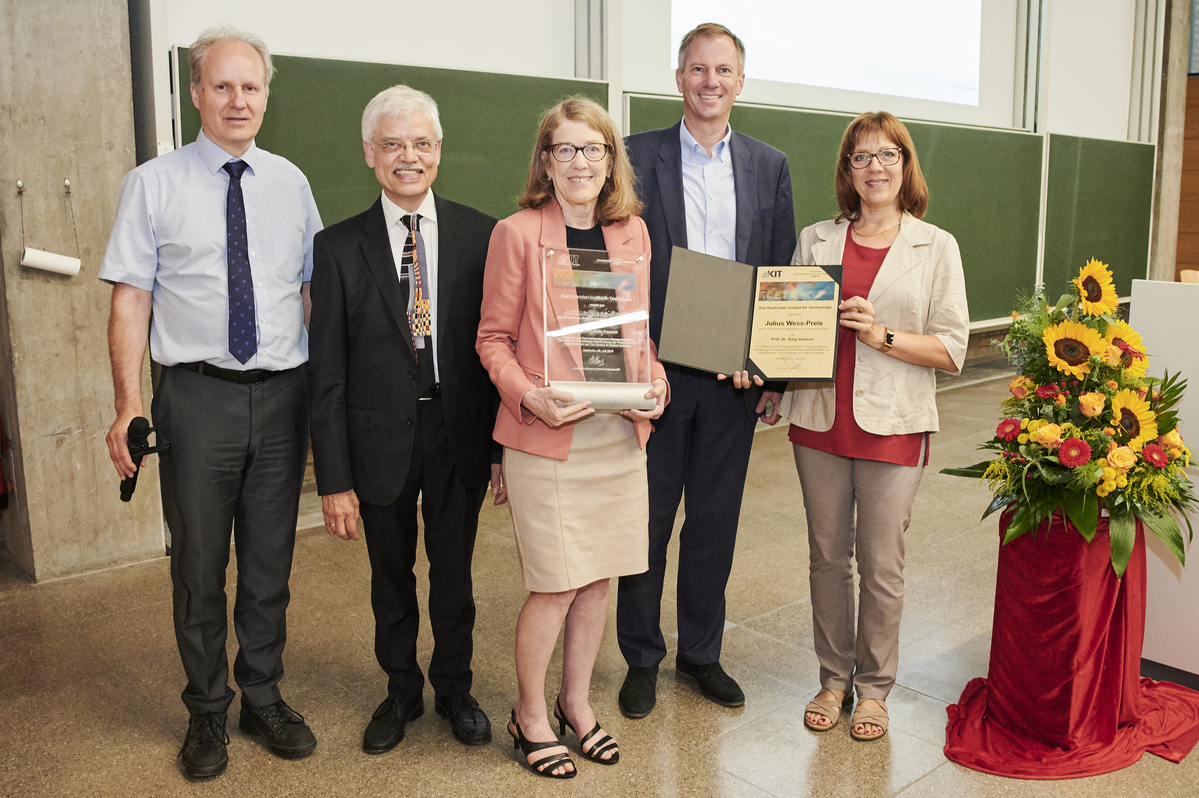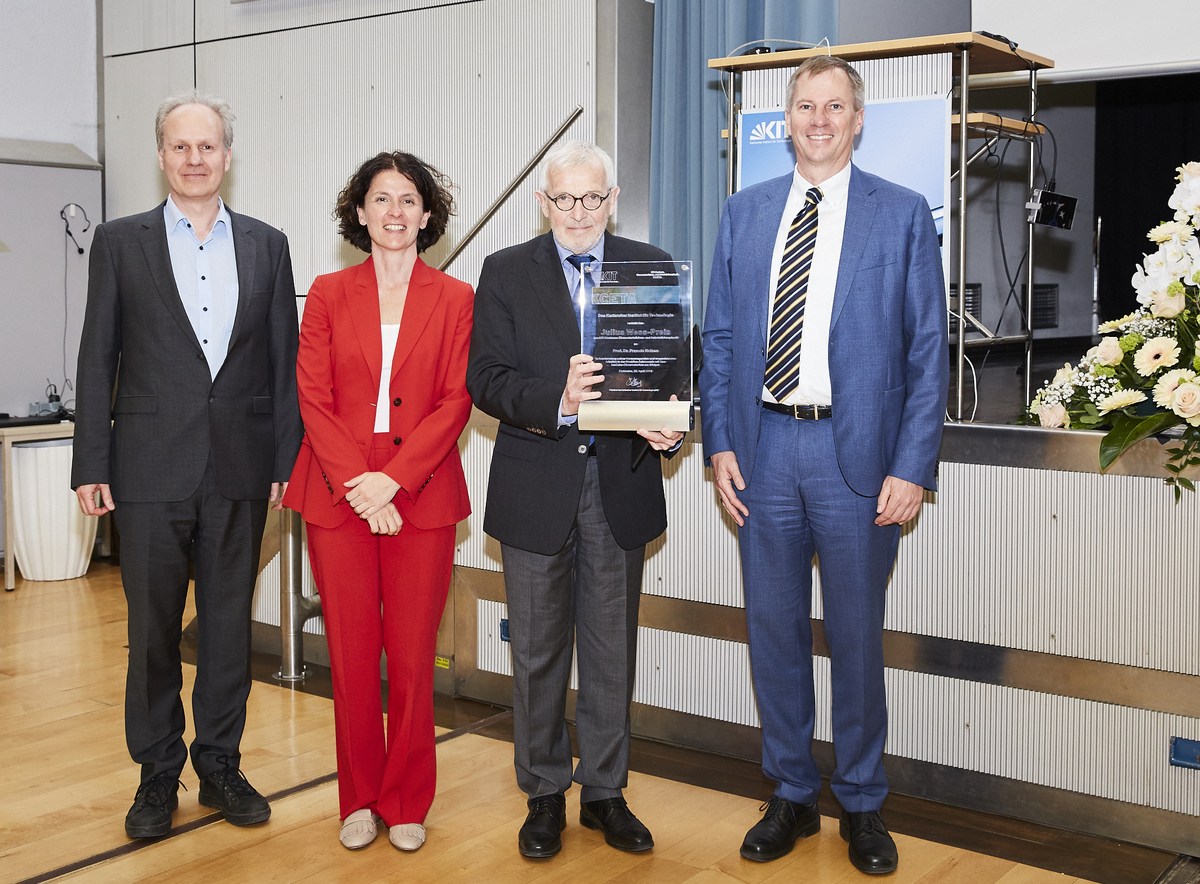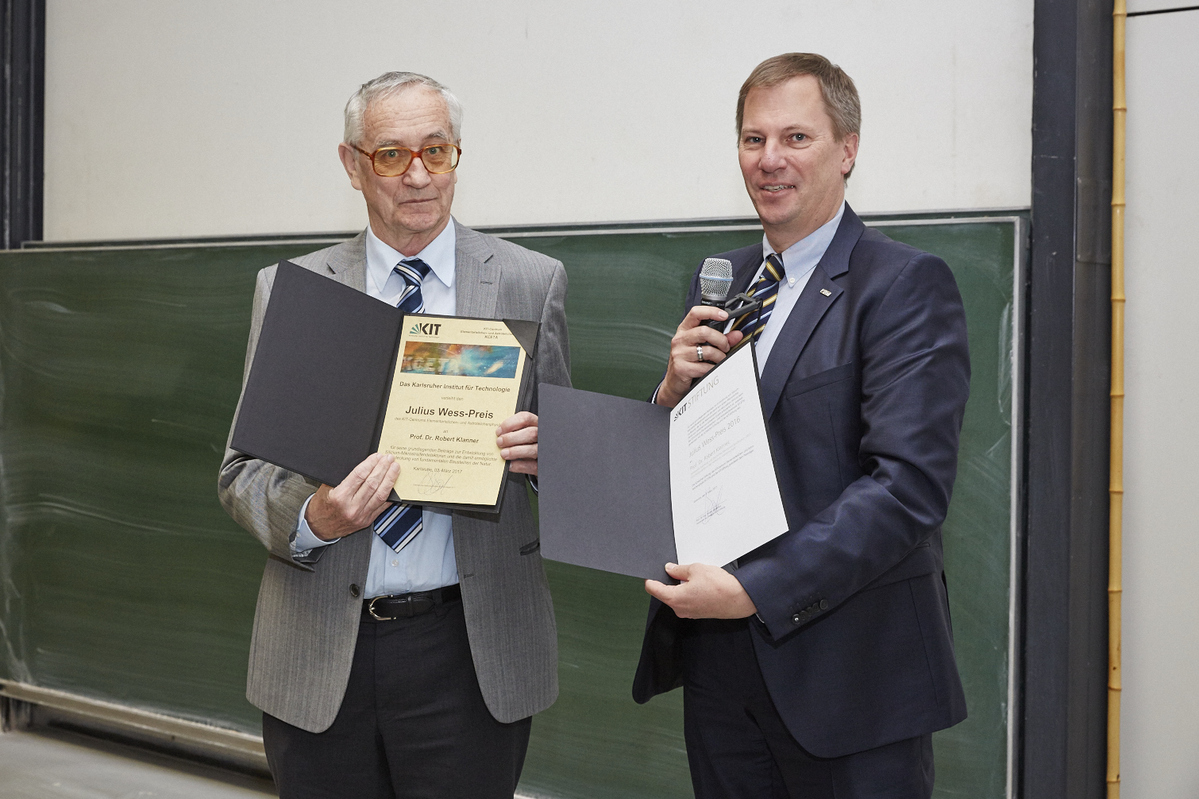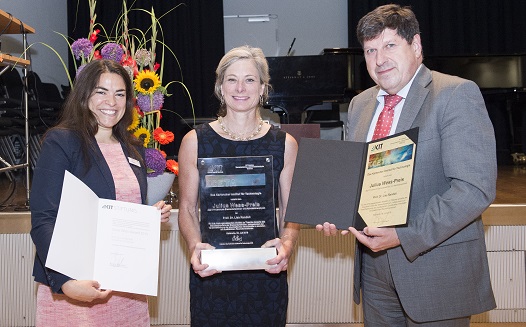Julius Wess-Prize
|
The KIT Center Elementary Particle and Astroparticle Physics (KCETA) regularly awards the Julius Wess Prize to elementary particle or astroparticle physicists for outstanding experimental or theoretical scientific achievements that broaden and deepen our understanding of the fundamental laws of nature. The prize was awarded for the first time to Nobel Laureate Professor Dr. Frank Wilczek at the opening ceremony of the Centre in November 2008. It is awarded in honour of Professor Dr. Julius Wess, who has been committed to theoretical and experimental elementary particle physics during his twenty years at KIT and who has published work of outstanding international importance during this time. We would like to thank the Schleicher Foundation for financing the prize money for the period 2015 to 2017. |
ALLGEMEINES: Informationen zum Preis
Informationen zum Julius Wess-Preis
Der Julius Wess-Preis wird zu Ehren von Prof. Dr. Julius Wess verliehen, der sich während seiner zwanzigjährigen Tätigkeit an der damaligen Universität Karlsruhe – heute KIT –für die theoretische und experimentelle Elementarteilchenphysik eingesetzt und während dieser Zeit wissenschaftliche Arbeiten von international herausragender Bedeutung veröffentlicht hat. Feldtheoretische Begriffe wie die Wess-Zumino-Wirkung oder die Formulierung der ersten supersymmetrischen Quantenfeldtheorie, des Wess-Zumino-Modells, sind mit seinem Namen verbunden.
Der Preis ist mit 10.000 Euro dotiert und wird von der Schleicher Stiftung in Kooperation mit der KIT-Stiftung finanziert. Er wurde erstmals bei der Eröffnungsveranstaltung des KIT-Zentrum Elementarteilchen- und Astroteilchenphysik (KCETA) im November 2008 verliehen. Die Preisverleihung ist jeweils mit einer für alle Studierenden offenen Vorlesungsreihe der Preisträger am KIT verknüpft. Diese Vorlesungen finden lebhaftes Interesse und tragen nachhaltig dazu bei, dass Studierenden, Doktorandinnen und Doktoranden Details über neueste Forschungsergebnisse vermittelt werden.
Wir bedanken uns bei der Schleicher Stiftung für Finanzierung des Preisgeldes. Weitere Informationen rund um den Preis finden Sie hier.
Julius Wess-Preis 2024
Glennys Farrar mit dem Julius Wess-Preis 2024 ausgezeichnet
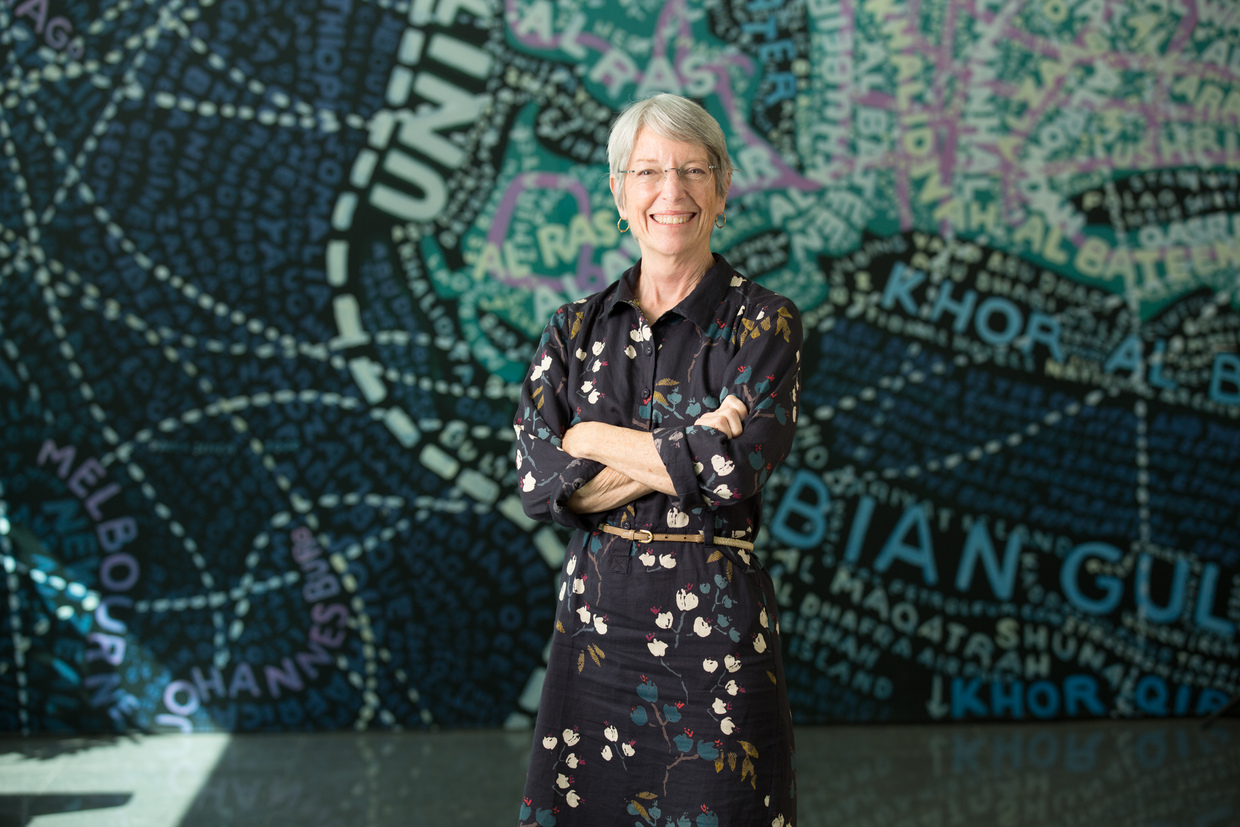
Der diesjährige Julius Wess-Preis 2024 ging an Professorin Glennys Farrar, US-amerikanische Teilchenphysikerin der New York University (USA) und dortige Inhaberin der Julius Silver, Rosalind S. Silver und Enid Silver Winslow Professur. Das KIT-Zentrum Elementarteilchen- und Astroteilchenphysik (KCETA) des Karlsruher Instituts für Technologie (KIT) würdigt damit ihre bedeutenden Beiträge zur Teilchenphysik und Astroteilchenphysik sowie ihre Pionierarbeit zur Struktur des galaktischen Magnetfelds. Am 18. Dezember 2024 fand die feierliche Verleihung des Julius Wess-Preises statt. Gestiftet wurde der mit 10.000 Euro dotierte Preis erneut durch die Erika und Dr. Wolfgang Eichelberger-Stiftung, Treuhandstiftung unter dem Dach der KIT-Stiftung.
Farrars Arbeiten zur Teilchen- und Astroteilchenphysik gelten als bahnbrechend. Sie trug unter anderem dazu bei, die physische Präsenz von Quarks in Materie nachzuweisen und das Magnetfeld unserer Milchstraße zu modellieren. Die Karte dieses Magnetfelds ist unerlässlich, um die Ankunftsrichtung der kosmischen Strahlung mit der Richtung ihrer kosmischen Quellen am Himmel in Verbindung zu bringen. In ihrer Arbeit über die Quellen der kosmischen Strahlung mit ultrahoher Energie konnte Farrar mit Kolleginnen und Kollegen erstmals die Zerstörung von Sternen durch die Gezeitenkräfte in der Nähe von superschweren schwarzen Löchern beobachten und stellte entscheidende indirekte Einschränkungen für die Quellen der kosmischen Strahlung mit ultrahoher Energie auf. Zudem leistete sie Pionierarbeiten auf dem Gebiet der Supersymmetrie.
Weitere Informationen zur Preisvergabe 2024 finden Sie in der Pressemitteilung des KIT vom 10.12.2024.
Nähere Informationen zum Julius Wess-Preis am KIT-Zentrum für Astroteilchen- und Elementarteilchenphysik erhalten Sie hier.
Die KIT-Stiftung bedankt sich vielmals für das große Engagement der Erika und Dr. Wolfgang Eichelberger Stiftung und gratuliert der Preisträgerin herzlich!
AKTUELLES: Prof. Mark Wise erhält Julius Wess-Preis 2021
Prof. Mark Wise erhält Julius Wess-Preis 2021
Am 5. November 2021 wurde der Julius Wess-Preis 2021 an Prof. Mark Wise, theoretischer Physiker für Hochenergiephysik am California Institute of Technolgy (Caltech) in den USA, verliehen. Prof. Wise erhält den Julius Wess-Preis in Anerkennung seiner bahnbrechenden wissenschaftlichen Leistungen auf dem Gebiet der theoretischen Teilchenphysik, insbesondere der Entwicklung moderner effektiver Feldtheorien für die Flavour-Physik, und seines hohen internationalen Ansehens.
Mehrere seiner Entdeckungen wurden inzwischen in Lehrbücher aufgenommen. Darunter die Entwicklung des schwach wechselwirkenden Teils des sogenannten Hamilton-Operators im Jahr 1979, der die Grundlage für die gesamte Theorie der Flavour-Physik darstellt. Weiterhin entwickelte Prof. Wise eine Theorie schwerer Quarks, die das Verhalten von Bausteinen der Atomkerne beschreibt.
Der sogenannte Flavour (engl. für Aroma) ist eine Quantenzahl, die – wie etwa die Ladung oder der Drehimpuls – zur Beschreibung des Zustands von Elementarteilchen dient. Sie ist bei Prozessen der schwachen und der starken Wechselwirkung von Bedeutung. Bei der starken Wechselwirkung, die für den Zusammenhalt von Atomkernen bestimmend ist, bleibt der Flavour erhalten.
Die KIT-Stiftung bedankt sich vielmals für das Engagement der Schleicher Stiftung und gratuliert dem Preisträger herzlich!
Julius-Wess-Prize 2018
Julius-Wess-Prize 2018
The Julius Wess Prize 2018 was awarded to the American physicist Sally Dawson in recognition of her outstanding scientific contributions to the theoretical description and deeper understanding of processes at hadron colliders, large facilities in which particles are accelerated to high energies and made to collide. In particular, the award is given in recognition of her work's reference to the physics of the Higgs boson, which gives matter mass, and the top quark, the most massive building block of matter. Her theoretical findings proved to be crucial for understanding the properties of the Higgs boson.
Professor Sally Dawson is a senior scientist at Brookhaven National Laboratory, USA.
The prize money of 10,000 euros was again donated this year with the kind support of the Schleicher Foundation in cooperation with the KIT Foundation.
Further information on the Julius Wess Prize at KCETA can be found on the KCETA homepage and on the awarding of the prize in 2018 in the KIT press release of 22 July 2019.
The KIT Foundation would like to thank the Schleicher Foundation very much for its great commitment and congratulates the laureate!
Julius-Wess-Prize 2017
Julius-Wess-Prize 2017
The Belgian physicist Francis Halzen was honoured for his outstanding scientific achievements in the field of astroparticle physics and his leading role in the international experiment IceCube. The award ceremony took place on 20 April 2018.
The prize money of 10,000 euros was again donated with the kind support of the Schleicher Foundation in cooperation with the KIT Foundation.
Further information on the Julius Wess Prize can be found on the KCETA homepage and in the KIT press release of 20 April 2018.
The KIT Foundation would like to thank the Schleicher Foundation very much for its great commitment and congratulates the laureate!
Julius-Wess-Prize 2016
Julius-Wess-Prize 2016
On 3 March 2017, the Austrian experimental physicist Prof. Dr. Robert Klanner, University of Hamburg and DESY, received the prize for his fundamental contributions to the development of silicon track detectors.
The prize money of 10,000 Euros was donated by the Schleicher Foundation in cooperation with the KIT Foundation.
Further information can be found on the KCETA homepage and in the KIT press release of 24.2.2017.
Julius-Wess-Prize 2015
Julius-Wess-Prize 2015
The Julius Wess Prize 2015 was awarded to Lisa Randall, Professor at Harvard University, for her groundbreaking work on theories beyond the standard model of elementary particles, in particular on the unification of basic physical forces in models with additional spatial dimensions.
The prize is endowed with 10,000 euros. The prize money was donated by the Schleicher Foundation, which is managed by Commerzbank, in cooperation with the KIT Foundation.
The award ceremony took place at KIT on July 8, 2016.
Further information can be found on the homepage of KCETA and in the press release of KIT dated 29.6.2016.

